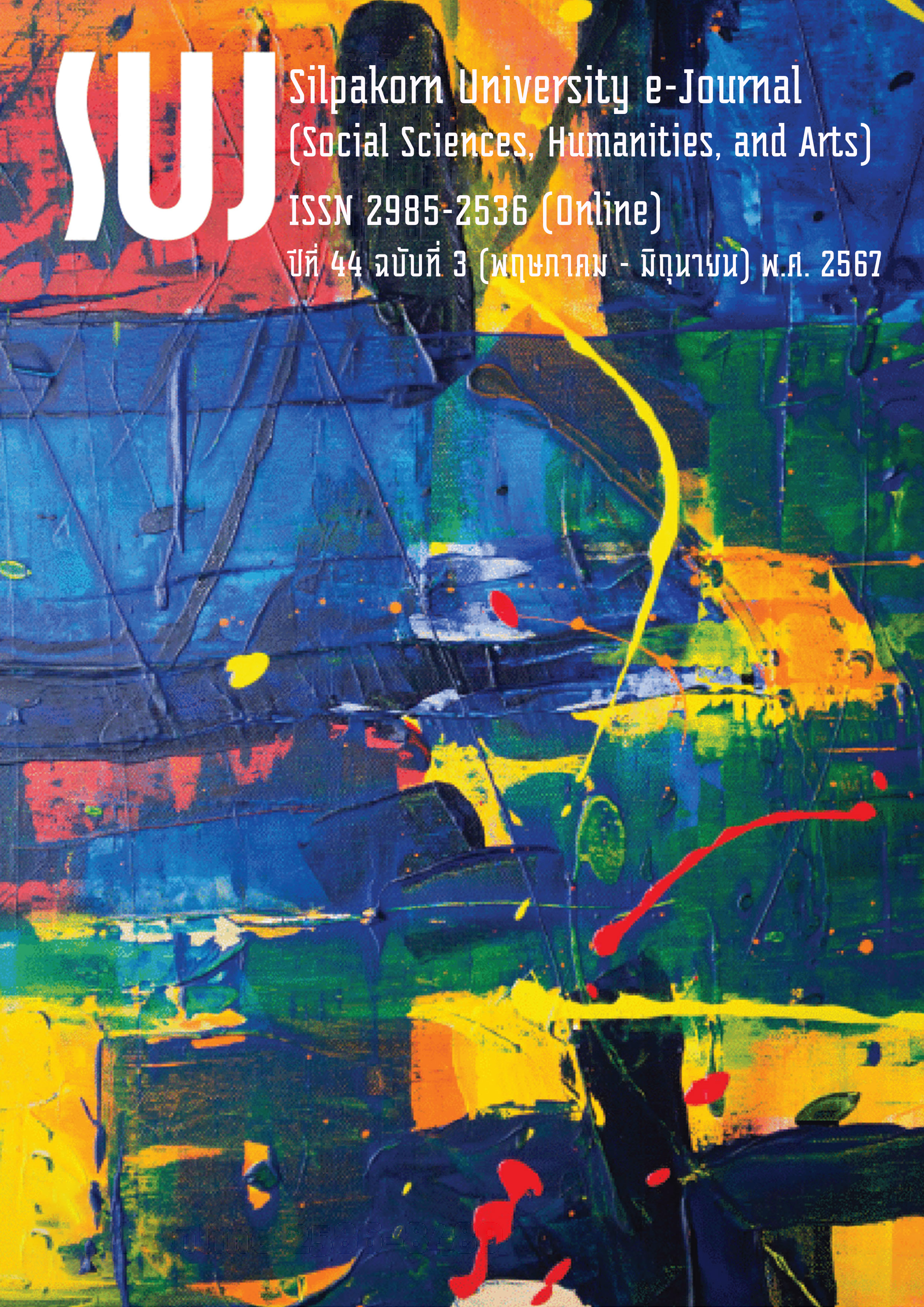ความสัมพันธ์ระหว่างภาษากับอุดมการณ์การท่องเที่ยวเพื่อ “แสวงบุญ” ในบริบทสังคมพุทธศาสนาของไทย (The relationship between language and the ideology of “Pilgrimage” tourism in the context of Thai Buddhist society)
Main Article Content
Abstract
บทความวิจัยนี้มีวัตถุประสงค์เพื่อศึกษาความสัมพันธ์ระหว่างภาษากับอุดมการณ์เกี่ยวกับการท่องเที่ยวเพื่อ “แสวงบุญ” ในสังคมไทย โดยใช้ระเบียบวิธีวิจัยตามแนววาทกรรมวิเคราะห์เชิงวิพากษ์ เก็บข้อมูลตัวบทจากบทสัมภาษณ์พระภิกษุสงฆ์และผู้ดำริสร้างประติมากรรมเทพศักดิ์สิทธิ์ในวัดพุทธเถรวาทในพื้นที่ปริมณฑล จำนวน 10 วัด ผลการวิจัยพบว่า การวิเคราะห์ตัวบทพบกลวิธีทางภาษาที่สื่ออุดมการณ์ “แสวงบุญ” จำแนกได้เป็น 3 กลุ่ม ได้แก่ 1) กลวิธีทางภาษาด้านการใช้คำและความเปรียบ 2) กลวิธีทางภาษาด้านการแสดงเหตุผล และ 3) กลวิธีทางภาษาด้านสหบท ในด้านวิถีปฏิบัติทางวาทกรรม พบว่า กระบวนการผลิตตัวบทเป็นกลไกจากพระสงฆ์ในฐานะผู้ธำรงและสืบทอดอายุพระพุทธศาสนา ส่วนกระบวนการแพร่กระจายตัวบทเป็นกลไกที่เกิดขึ้นจาก “สื่อใหม่” ซึ่งพุทธศาสนิกชนสามารถเข้าถึงได้โดยง่าย ในด้านวิถีปฏิบัติทางสังคมและวิถีปฏิบัติทางวัฒนธรรม พบว่า ความคิดในสังคมและวัฒนธรรมไทยที่มีอิทธิพลต่ออุดมการณ์การท่องเที่ยวเพื่อ “แสวงบุญ” สามารถจำแนกออกได้เป็น 4 ประเด็น ได้แก่ 1) ความคิดเรื่องทุกข์ที่สัมพันธ์กับอุดมการณ์ “แสวงบุญ” 2) ความคิดเรื่องบุญที่สัมพันธ์กับอุดมการณ์ “แสวงบุญ” 3) ความคิดเรื่องกรรมที่สัมพันธ์กับอุดมการณ์ “แสวงบุญ” และ 4) ความคิดเรื่อง “เทวดานุสติ” ที่สัมพันธ์กับอุดมการณ์ “แสวงบุญ” เป็นประเด็นที่เชื่อมโยงเรื่อง “ทุกข์” “บุญ” และ “กรรม” เข้าด้วยกัน งานวิจัยนี้เป็นแนวทางการศึกษาที่บูรณาการระหว่างศาสตร์ทางด้านคติชนวิทยา สายมานุษยวิทยาภาคสนามกับศาสตร์ทางด้านการใช้ภาษาเพื่อการสื่อสาร เพื่อสะท้อนให้เห็นได้ว่าความเชื่อเกี่ยวกับเทพศักดิ์สิทธิ์ไม่สามารถเกิดขึ้นเองในสังคม แต่เกิดจากการประกอบสร้างชุดความเชื่อในวัฒนธรรมไทย โดยอาจมีการวางรากฐานและปลูกฝังผ่านกระบวนการทางสังคม ทั้งโดยตั้งใจและไม่ตั้งใจจนกระทั่งมีลักษณะเป็นสัญลักษณ์ทางอัตลักษณ์ของพื้นที่ท้องถิ่นของไทย
This research article investigates the interconnection between language and ideology within the context of “pilgrimage” tourism in Thai society, employing a methodological framework grounded in Critical Discourse Analysis. Data were sourced from interviews conducted with monks and those responsible for crafting sacred deities’ sculptures across 10 Theravada Buddhist temples in the area adjacent to Bangkok. The study’s findings reveal that the discursive strategies used to articulate the ideology of “pilgrimage” can be categorized into three distinct groups: 1) linguistic strategies involving the use of specific terminology and analogies, 2) linguistic strategies related to articulating rationales, and 3) intertextuality linguistic strategies. Regarding discourse practices, the research identified the script creation process as a mechanism facilitated by monks, who act as custodians and transmitters of Buddhist teachings. The dissemination of these scripts is further augmented by “new media,” enabling Buddhists to access these texts readily. In examining the socio-cultural practices, the study delineates four primary societal and cultural notions influencing the “pilgrimage” tourism ideology: 1) the concept of suffering, 2) the concept of merit, 3) the concept of karma, and 4) the concept of “Devatanusati.” These concepts are intricately linked, collectively shaping the ideological framework of “pilgrimage” within Thai society, intertwining notions of suffering, merit, and karma. This research integrates the study of folklore studies with field anthropology and language use in communication to reflect that beliefs concerning sacred deities do not arise spontaneously in society but are constructed through Thai cultural belief systems. These beliefs are likely established and ingrained through both intentional and unintentional social processes, eventually becoming symbolic identities of local Thai communities.
Downloads
Article Details

This work is licensed under a Creative Commons Attribution-NonCommercial-NoDerivatives 4.0 International License.
References
Brandon, S. G. F. (Ed.). (1970). A Dictionary of Comparative Religion. London: Weidenfeld and Nicolson.
Bumrungkarn, Rujira, & Thepkanjana, Kingkarn. (2017). Syntactic, semantic and pragmatic properties of the negative form /plàaw/ in Thai (คุณสมบัติทางวากยสัมพันธ์ อรรถศาสตร์ และวัจนปฏิบัติของรูปปฏิเสธ เปล่า ในภาษาไทย). Journal of Letters, 46(2): 295-343.
Chotidilok, Suntaree. (2017). [BUN] ‘MERIT’: The Relationship Between Language and Ideology in Discourses Produced by Wat Phra Dhammakaya (บุญ : ความสัมพันธ์ระหว่างภาษากับอุดมการณ์ในวาทกรรมที่ผลิตโดยวัดพระธรรมกาย). Doctoral dissertation, Chulalongkorn University, Bangkok, Thailand.
Fairclough, N. (1992). Discourse and Social Change. Cambridge: Polity Press.
Fairclough, N. (1995). Critical Discourse Analysis: The Critical Study of Language. London: Pearson Education.
Mahachulalongkornrajavidyalaya. (1996). THE TIPITAKA Book 31: Sutta Pitaka Book 23: Khuddakanikāyassa Paṭisambhidāmaggo (พระไตรปิฎกเล่มที่ 31 พระสุตตันตปิฎก เล่มที่ 23 ขุททกนิกาย ปฏิสัมภิทามรรค). Bangkok: Mahachulalongkornrajavidyalaya.
Paksasuk, Amnat. (2019). Discourse about “PUÑÑA” in Public Media (วาทกรรมเกี่ยวกับ “บุญ” ในสื่อสาธารณะ). Doctoral dissertation, Silpakorn University, Nakhon Pathom, Thailand.
Puangklad, Boonthiwa. (2011). “Booniyom” discourse in case of Ratchathaniasoke Community, Ubon Ratchathani Province (วาทกรรม “บุญนิยม”: กรณีศึกษาชุมชนราชธานีอโศก จังหวัดอุบลราชธานี). Journal of Humanities and Social Sciences, Khon Kaen University, 28(2): 174-207.
Pongchaliew, Kitirach. (2017). The discourse and trading in I-San Jataka story “Kampra Toob Tong” (วาทกรรมและการค้าในชาดกอีสานเรื่องกำพร้าตูบตอง). Journal of Language, Religion and Culture, 6(2): 1-19.
Turner, V., & Turner, E. (1978). Image and Pilgrimage in Christian Culture. NY: Columbia University Press.
Interviews
Churchwarden of Wat Chulamanee, Samut Songkhram Province. Interview, October 16, 2023.
Monk of Wat Phai Lom, Nakhon Pathom Province. Interview, September 18, 2023.
Monk of Wat Phrong Akat, Chachoengsao Province. Interview, August 21, 2023.
Monk of Wat Saman Rattanaram, Chachoengsao Province. Interview, August 13, 2023.
Monk of Wat Sri Samosorn, Pathum Thani Province. Interview, October 4, 2023.
Monk of Wat Sri Waree Noi, Samut Prakan Province. Interview, October 23, 2023.


